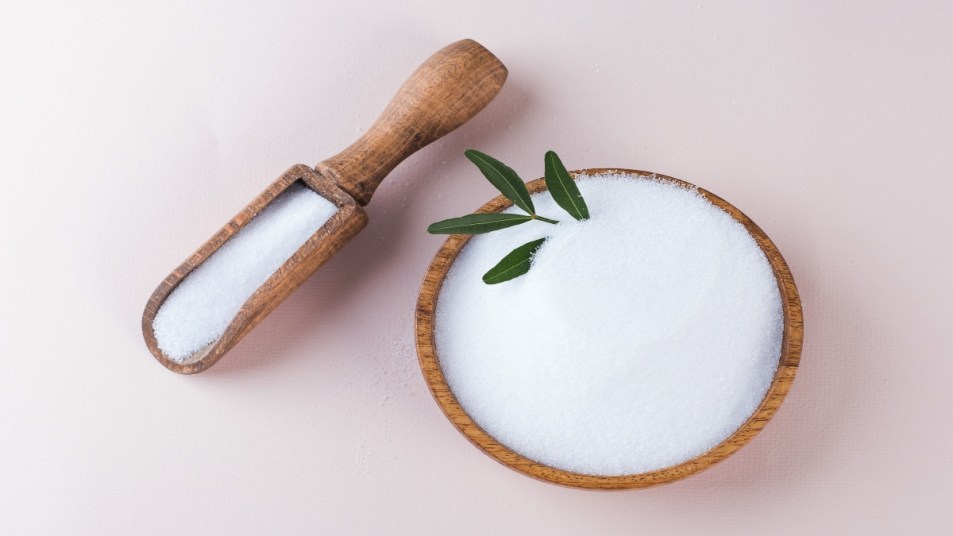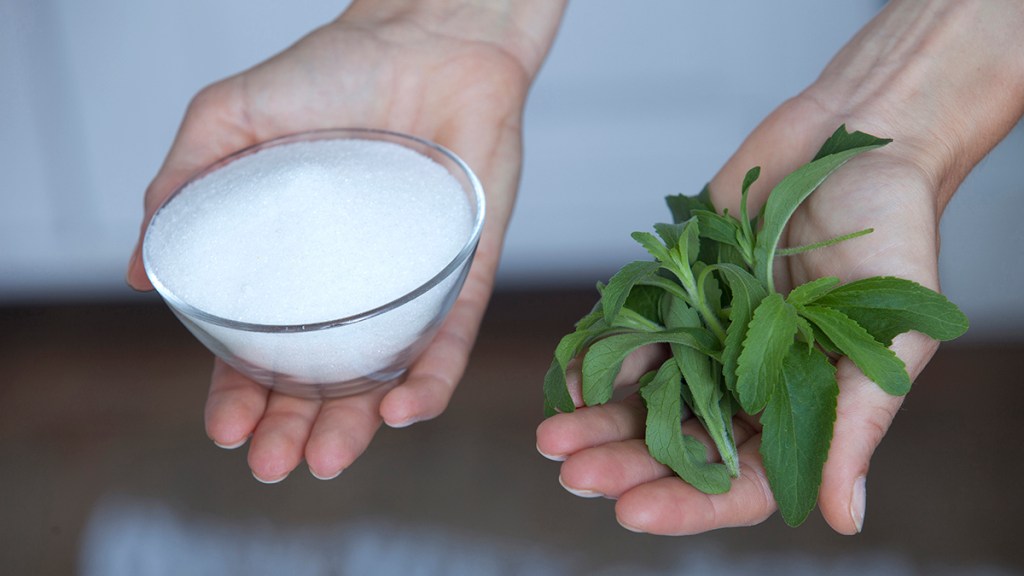New Study Links Erythritol to Blood Clots —Nutrition Pros on What You Need to Know
MD: If you're concerned about blood sugar levels, stevia is "hands down the healthiest choice"

These days it seems everyone is looking to cut back on sugar. That’s a great thing, considering the damage excess sugar can do to the body. But we still want to enjoy a sweet treat now and then. That’s where low- and no-calorie sugar substitutes come in. There are so many out there, from our old favorites aspartame, sucralose and saccharin to newer ones like erythritol and stevia. Like the older sweeteners, erythritol and stevia offer the taste of sugar without the calories — and they don’t raise blood glucose levels. But there are key differences between these sweeteners. Read on to determine which sweetener is a better choice for you: erythritol vs. stevia.
What is erythritol?
Erythritol is a sugar alcohol produced from simple sugars in corn. It’s considered an artificial sweetener, even though it’s found naturally in small amounts in fruits like grapes, peaches, watermelon and pears; vegetables like mushrooms; and some fermented foods and drinks like cheese, beer, sake and soy sauce. But it’s also added to foods as a sweetener at much higher levels. The low-calorie sweetener is about 70% as sweet as table sugar, so it takes more to create the same level of sweet taste.
What is stevia?
Stevia is a zero-calorie, natural sweetener and sugar substitute derived from the leaves of the plant species Stevia rebaudiana, also known as sweetleaf, native to Brazil and Paraguay. The active compounds of stevia are steviol glycosides, which have up to 150 times the sweetness of sugar. These compounds are heat-stable, pH-stable, and do not ferment, making them useful in packaged foods.

Where you’ll find erythritol and stevia
You can buy the sweeteners on their own in various forms, from liquids and powdered products to cubes and individual packets to use in baking and to sweeten coffee and tea. But they’re also found in thousands of processed foods like soft drinks, flavored waters, yogurt, protein bars, chewing gum, candies and salad dressings labeled “low-sugar,” “no-sugar,” “keto” or diabetic-friendly. Indeed, nearly half of all American homes have products containing stevia in their pantries.
Some products include both stevia and erythritol, says Elizabeth Dunford, PhD, a food policy project consultant at The George Institute for Global Health, a senior lecturer in the Faculty of Medicine at the University of New South Wales and an adjunct assistant nutrition professor at the University of North Carolina at Chapel Hill.
Surprisingly, even many of the natural sweeteners themselves, including stevia and monk fruit, add erythritol to their product. The reason? A packet of stevia doesn’t pour in the same way a packet of sugar does, explains Debbie Petitpain, MS, RDN, a spokesperson for the Academy of Nutrition and Dietetics. To overcome this obstacle, manufacturers will add fillers like erythritol to help improve bulk and texture. That way the sweetened product better resembles table sugar in volume or feel. So if you pick up a package of stevia, you may also be getting erythritol, which makes reading labels key (more on that later).
Are erythritol and stevia safe to consume?
Stevia sweeteners are made from components of the stevia leaf and are considered ‘generally recognized as safe’ (GRAS) by the U.S. Food and Drug Administration (FDA), which doesn’t guarantee that a product is 100% safe but acknowledges that there’s a consensus among experts that the product won’t cause harm when used as intended.
In 2001, the FDA classified erythritol as GRAS. But research published in the journal Nature Medicine in February 2023 found that people who had suffered a stroke or heart attack had higher levels of erythritol in their bodies than those who had not suffered a cardiac event. Subsequent studies in both humans and mice suggested that consuming erythritol can increase blood clot formation. “This, in turn, could increase the chance of heart attack or stroke,” according to a statement from the National Institutes of Health, which funded the research.
But some say it’s too early to make sweeping recommendations about erythritol just yet.
“As with almost anything consumed to excess, sweeteners have been linked to negative health effects,” says Dunford, who was not involved in the research. “The recent Nature Medicine study found that higher levels of erythritol were connected to a greater risk of heart attack, stroke or death. It is important to note that most of the people in the study were already at higher risk for heart disease and stroke. However, even in healthy participants they found that consuming large amounts of erythritol in one sitting elevated blood levels to an undesirable level,” she explains.
Finally, both erythritol and stevia are generally tolerated well, says Vandana Sheth, RDN, owner of VandanaSheth.com, a nutrition consulting business in Los Angeles. “But in high doses, they may cause issues with the gut. We need more comprehensive research to look at the effect of non-nutritive sweeteners and their effect on gut health.” Petitpan adds that it’s possible to build a tolerance to these GI effects and suggests starting out with small doses and seeing how you feel before adding more to your diet.
Stevia may be the best option for people with diabetes
“If you are concerned about your blood-sugar levels, stevia is hands down the healthiest choice, especially if you have diabetes,” says nutrition expert Fred Pescatore, MD. “Stevia doesn’t cause any blood-sugar disturbances.” In fact, a study in the journal Appetite showed that diabetics who used stevia had lower blood-sugar levels than those who used artificial sweeteners. (Click through for more info on stevia and diabetes.)
Adds Sheth, “There is some data that suggests that stevia may help lower triglycerides, blood pressure and cholesterol.” It’s also been shown to speed weight loss: In one study, 77% people who replaced table sugar with stevia lost a significant amount of weight.
Best uses for erythritol and stevia
“Both sweeteners can be used in coffee and tea or added to foods such as smoothies, yogurt or cereal,” says Sheth. “They can also be used in baking, but based upon the sweetness, especially stevia, you may need to adjust the amount.” (This conversion chart can help you determine how much stevia and erythritol to substitute for table sugar.)
Many people use the sweeteners in baking, but it isn’t always a perfect swap, says Petitpain. “From a food science perspective, sugar can brown and caramelize, while erythritol and stevia don’t go through same chemical reaction, and they won’t brown or caramelize,” she explains. “When you add sugar to eggs to make a merengue, sugar will give the mixture fluff. It won’t have the same effect with stevia or erythritol.” The bottom line? “If sugar provides another function, then just sweetness, there may not be a functional switch if you use stevia or erythritol in the recipe.”
What’s more, says Steth, “Stevia can have an aftertaste that may affect the finished product. Erythritol may not be good for making ice cream, as it does not dissolve like table sugar and can crystallize.”
The bottom line
It’s a good idea to take a close look at exactly what you’re eating when it comes to artificial sweeteners and note portion sizes, says Dunford. “I would advise consumers to always read the label of foods you are buying. Food companies must list sweeteners in the product’s ingredients list. However, they do not have to show how much of the sweetener is included in the product. As a rule, products containing non-sugar sweeteners should be consumed in moderation, with the bulk of the diet deriving from minimally processed and fresh produce.”
If you have any chronic health condition, it’s always a good idea to discuss dietary changes and questions with your healthcare professional, says Dunford. Adds Sheth, “If you live with diabetes, “consider meeting with a registered dietitian nutritionist and diabetes care and education specialist to get personalized guidance to better meet your nutritional needs.”
Of course, there are many other artificial and natural sweeteners on the market, all with their own benefits and downsides. Click through to see how the natural sweetener allulose can help you lose weight, plus how sucralose can cause GI upset.
To learn more about the health benefits and dangers of sweeteners:
5 Natural Sweeteners That’ll Help Balance Blood Sugar, Reduce Cholesterol, Burn Fat, and More
3 Natural Sweeteners to Try If You Have High Cholesterol, Diabetes, or Catch Colds Easily
We Taste-Tested Two Artificial Sweeteners: This Is the One We Liked Best












